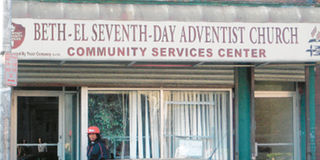Obama-mania encroaches on Kenyan village in US city

Jersey City’s Beth-El Seventh-Day Adventist Church Community Services Centre. Photos/MACHARIA GAITHO
It looks like a typical storefront in a poor and black-dominated part of any large US city.
It is in a tough neighbourhood of Jersey City — and Jersey City is tough by American standards— flanked by bars, liquor stores and other enterprises probably dealing in more disreputable activities.
Not very far away young men in hoods, sagging jeans and expensive sneakers lounge around, while older men with little better to do sip from bottles concealed in brown paper bags.
But the particular address of 215 Martin Luther King Boulevard seems to be an oasis of peace in a rough and tough neighbourhood.
Entering the Community Services Centre of the Beth-El Seventh Day Adventist Church last Saturday afternoon, the Nation team was in for a cultural shock.
In a flash, we were transported from one of the toughest US black inner-city neighbourhoods to a corner of Kenya planted here.
All the people in the room are Kenyan and the language one hears is not just Kiswahili, but Ekegusii, the Kisii language.
Even when English is spoken, it does not come with the American drawl, but the distinctive Kisii accent.
The food, too, is traditional fare, with some twists because of the ingredients available.
Church elders are just finishing their lunch after a service and are preparing another meeting to plan their activities.
Upstairs, younger people are holding their own meeting, and also discussing church and community matters.
It is only at the younger people’s meeting that one hears various American accents — ranging from the black inner city one to the white mid-west drawl and the cultivated Ivy League.
But every so often as the conversation gets animated, some vernacular, or at least the accent, would break into the conversation.
Jersey City has one of the largest concentrations of Kenyans in the US, but what makes it peculiar is that a large majority are Abagusii, turning some neighbourhoods into virtual Kisii enclaves.
This particular church is, in fact, a branch of Maxwell of Nairobi’s Milimani Road.
When our team arrived, there was much excitement because many people at the meeting are also actively involved at the community and local levels in Democratic Party candidate Barack Obama’s campaign for the US presidency.
They shared with us their motivation:
Richard Maburi
I’m president of Kenyan-Americans Community Association Inc in New Jersey. It’s a good year for Kenyan-Americans because we have Barack Obama running for president.
He’s making history as the first African-America making a serious bid for the presidency and he’ll make history as the first one to be elected.
He is Kenyan blood, but it is policies that motivate young people to register as voters and to join his campaign for change. I have been working as a campaign volunteer, making telephone calls, sending e-mails and raising funds.
There is a Kenyan-American community of at least 5,000 in New Jersey and they are all excited by Obama’s message of change. Many have given donations ranging from $5 (Sh375) to $500 (Sh37,500).
Shem Onditi
I have been voting in the US for many years. Now I am busy canvassing and helping to mobilise voters for the Obama campaign.
At present I am concentrating not in the section of Jersey City where I reside, but in the neighbouring Essex County where there are many Republicans whom we need to win over.
I support Barack Obama because this is the chance for change. Obama is offering much more for change than McCain, and his ideas are more relevant to ordinary people.
I don’t support Obama just because of the Kenyan connection or because I am a Kenyan-American. This is not a Kenyan issue; it an issue for all of us Americans.
Zachary Moitui
I am a high school teacher in New Jersey. I am involved in the campaign because Barack Obama is the best hope for not just African-Americans but for all Americans.
This country has gone in the wrong direction. The economy is flagging, people are losing their homes and job losses are increasing.
As a Kenyan-American, it is my moral duty to work for the change the US needs.
We have in our organisation of School Workers Union in Jersey City of 1,800 members, many of whom are volunteering for the Obama campaign.
On the voting day, November 4, I will wake up early at 6.30am and go and cast my vote. Luckily, the Board of Education has given us the day off, so I will be helping to transport young people to make sure they vote.
Douglas Bonuke
I am secretary of the Kenyan-Americans Community Association and I’m involved in mobilising voters for the Obama campaign.
I have been sending out e-mails, making phone calls and knocking on doors. I also compile and maintain a data bank of Kenyans we are reaching out to become a part of this campaign for change by volunteering their time as campaign organisers.
Haron Omwamba
I am working with students, sensitising them on the importance of voting.
We are tired of the same old things and in the Barack Obama campaign team we are working towards a change for the better.
Wycliffe Mugoya
I am a Kenyan-American and have been in the US for 15 years.
I was first attracted to Barack Obama when I watched him make the keynote speech at the 2004 Democratic Party convention that nominated John Kerry. I related to that and connected with him.




